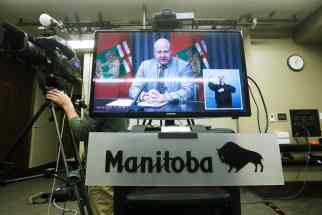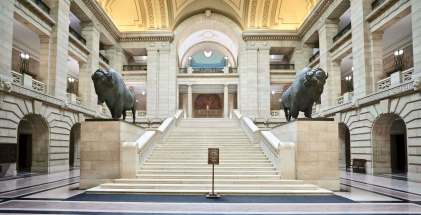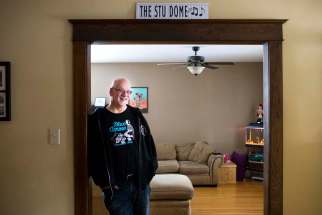Silent storm Opposition voices on the outside as Brian Pallister's government makes historic decisions from a near-vacant bubble on Broadway
Read this article for free:
or
Already have an account? Log in here »
To continue reading, please subscribe:
Monthly Digital Subscription
$0 for the first 4 weeks*
- Enjoy unlimited reading on winnipegfreepress.com
- Read the E-Edition, our digital replica newspaper
- Access News Break, our award-winning app
- Play interactive puzzles
*No charge for 4 weeks then price increases to the regular rate of $19.00 plus GST every four weeks. Offer available to new and qualified returning subscribers only. Cancel any time.
Monthly Digital Subscription
$4.75/week*
- Enjoy unlimited reading on winnipegfreepress.com
- Read the E-Edition, our digital replica newspaper
- Access News Break, our award-winning app
- Play interactive puzzles
*Billed as $19 plus GST every four weeks. Cancel any time.
To continue reading, please subscribe:
Add Free Press access to your Brandon Sun subscription for only an additional
$1 for the first 4 weeks*
*Your next subscription payment will increase by $1.00 and you will be charged $16.99 plus GST for four weeks. After four weeks, your payment will increase to $23.99 plus GST every four weeks.
Read unlimited articles for free today:
or
Already have an account? Log in here »
Hey there, time traveller!
This article was published 24/04/2020 (2058 days ago), so information in it may no longer be current.
At the Manitoba Legislative Building in the time of COVID-19, the functioning of government continues, but the atmosphere is subdued.
April is usually one of the busiest months at 450 Broadway, with the legislature sitting daily. The building is normally abuzz with MLAs and cabinet ministers, political and permanent government staff scurrying between meetings.
The broad corridors of the grand structure often teem with tourists and school groups — the visitors galleries inside the ornate legislative chamber frequently jammed with observers.
But during the pandemic, the massive century-old building is eerily quiet, the large parking lot that encircles it little more than half-full.
Due to coronavirus restrictions, visitors are currently barred from the people’s building, except by appointment, and MLAs are on hiatus from the oft-raucous chamber.
“Every day feels like a weekend (day at work),” a cabinet minister remarked this week, describing the quiet.
But that relative calm belies the momentous decisions being made — decisions that have shuttered countless workplaces, closed classrooms, restricted Manitobans’ movements, and, potentially, plunged the province into billions of dollars of debt.

Premier Brian Pallister’s news conferences, in a room in the basement, have become almost daily events. The difference is journalists listen in and ask questions remotely instead of in person.
Most MLAs and many government staff work from home. Cabinet ministers, however, spend most days in the office, as are their staff.
Pallister and his 14-member cabinet continue to meet in person most Wednesdays, but the location has changed. Instead of filing into the cosy meeting room next to the premier’s office, they convene in a large committee room to observe physical-distancing guidelines.
Adding to the quiet is the absence of dozens of part-time staff who work only when MLAs sit. They’ve been laid off.
Many permanent legislative staff work remotely.
“After a lot of technological challenges, we’ve got the majority of our people set up at home with secure computer environments,” said Speaker Myrna Driedger, who supervises a staff of more than 100, including part-time workers.
• • •
Education Minister Kelvin Goertzen says his workload hasn’t eased during the COVID-19 pandemic, although it has changed.
There’s also been much more pressure on Goertzen and fellow cabinet ministers due to the magnitude of the crisis and the momentous decisions the government has had to make to contain the deadly virus.
“There’s no question that the consequences of the (government’s) decisions are of a magnitude that none of us have experienced,” said Goertzen, a 17-year MLA, who represents Steinbach.
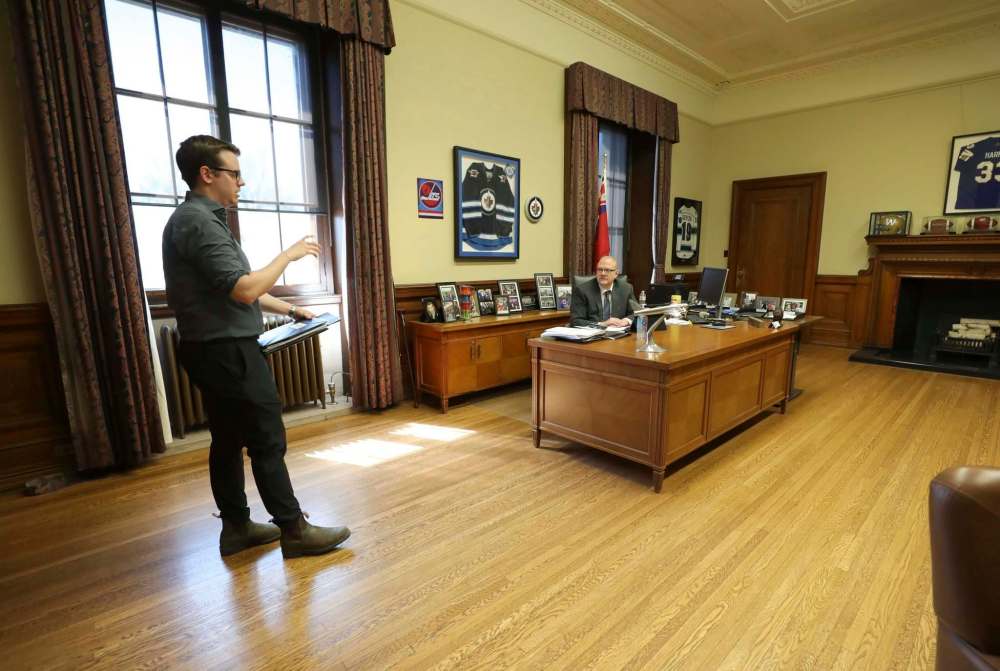
“The closing of schools indefinitely, I don’t believe, is something that any minister of education has done in Manitoba history. The enormity of some of those decisions definitely weighs on you, and I’m sure it does for every cabinet colleague.”
Pallister has not formed a special cabinet committee to deal with the crisis. Instead, there is a health incident command team, led by Dr. Brent Roussin, the provincial chief public health officer and Lanette Siragusa, chief nursing officer with Shared Health.
All cabinet ministers receive daily 10 a.m. briefings — via telephone conference call — from Roussin and emergency management officials.
“The principle we’re operating under is we don’t want to have surprises,” Goertzen said of the briefings. “We’re already making decisions that are monumental and (made) quickly because they have to be made quickly. You don’t want to add on top of that people being surprised, right?”
As for his workday, Goertzen holds fewer in-person meetings, but reaches out a lot more over the phone and via teleconferences.
Oddly enough, he said, he’s “more connected now” with education stakeholders than before the pandemic.
In part, that’s been out of necessity, he said, due to issues related to classes being suspended during the pandemic.
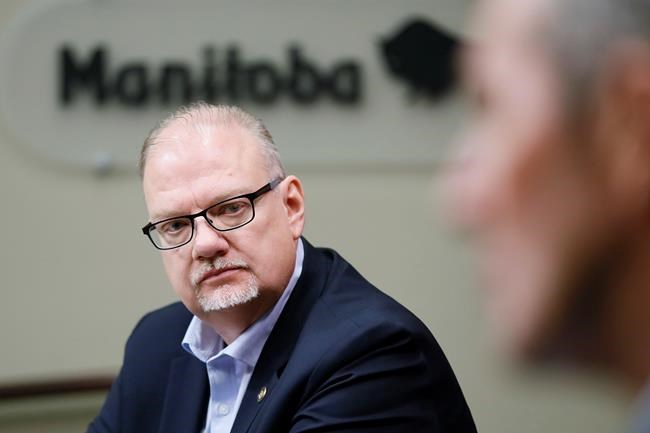
Department workers are in daily contact with the school boards association, while Goertzen participates in weekly conference calls with various groups, including school superintendents, the Manitoba Teachers’ Society and the Manitoba Federation of Independent Schools.
“Before (the pandemic), you might not have done that because it seemed sort of impersonal to have a phone call, right?” he said. “Now… people are happy to have this conference call or phone call. So, in some ways, I think we’ve become more connected.”
In addition to running a large government department, the 50-year-old Goertzen is house leader, with the responsibility to shepherd bills through the legislature.
With the legislative session suspended — MLAs have sat only one day, with limited numbers, since March 19 — Goertzen’s house duties have been greatly diminished.
However, his constituency workload has mushroomed.
“The number of constituency emails and calls have probably gone up four-fold because there are just so many questions,” he said.
On the other hand, as a politician who attends about 150 evening meetings and events every year, the prohibition on public gatherings of than 10 people has given him more time with his wife and son.
“The one noticeable difference for my personal life is that I notice that I’m actually home in the evenings, at 7:30 or 8 o’clock, which I haven’t really experienced for almost two decades,” he said.
• • •
Gary Filmon also governed the province at a time of crisis — 1997’s Flood of the Century, which, at one point, threatened to inundate the entire city of Winnipeg.
Unlike the current emergency, there was no reason to shut down the legislature. So Filmon, unlike Pallister, was answerable for his actions in the chamber on a daily basis.
“We had question period every day, and then I had scrums following question period with the news media every day. It was quite different in that respect,” the former Progressive Conservative premier said this week.
Filmon can relate to the pressure Pallister and his cabinet must be feeling at the moment.
“This certainly is a time of high stress, high tension,” he said.
Filmon recalls overseeing daily 7 a.m. and 7 p.m. meetings of the province’s emergency management committee, which included either ministers or deputy ministers of key affected departments, the heads of Crown corporations and representatives from Winnipeg police, RCMP and the Canadian Forces, which played a key role in the flood fight.
“I didn’t get a lot of sleep. I’ll tell you that,” said Filmon.
“I didn’t get a lot of sleep. I’ll tell you that.” – Gary Filmon on his time governing during the Flood of the Century
“There’s no question that there’s an enormous responsibility placed on people to make the best decisions they can with the best information that’s available to them,” he said. “And sometimes you just literally have to sweep everything off your desk and concentrate on one problem.”
One such occasion was when a retired engineer alerted officials that the huge wave of water heading Winnipeg’s way from North Dakota could get around flood fortifications via the La Salle River. That left the province with just six days to build the Z-dike near Brunkild.
Filmon was awakened in the middle of the night at one point in the crisis and told the dike protecting Ste. Agathe had burst, flooding the town. He feared the Red River Valley’s other ring dikes were also vulnerable.
“There was a lot of tension. In the end, we felt so responsible; at least I felt so responsible,” he said.
“It was difficult to spend any relaxed time. It was all a matter of keeping in touch with and keeping on top of all these critical issues.”
• • •
Life has changed for the leader of the Opposition.
Before COVID-19, Wab Kinew would get up early, go for a run, walk his children to where they catch the school bus and then head to the legislature to meet with his staff to “hatch out a plan for how we’re going to take over the world that day.”

There would be caucus meetings, stakeholder meetings, preparing for question period in the afternoon then, after the session, scrumming with reporters before attending community events most nights. Now, all of that has changed.
“The rubber-chicken circuit stopped entirely,” Kinew said of the gatherings he’d attend, something he enjoyed.
Now, the NDP leader works from home alongside his physician spouse, two school-age children, a toddler, two dogs and a cat.
“I’ve made more meals at home in the past month and I’ve enjoyed cooking,” he said.
He may be working remotely from home but he said he’s busier than ever.
His regular morning meetings are conducted by phone or on the Zoom app instead of in person at the legislature.
“We made the decision to work remotely,” said Kinew, who doesn’t have a home office.
There’s a spot in the living room he gravitates to for talking on the phone and teleconferencing with his caucus and community groups.
“We’ve settled into a new routine,” he said from his home, which has become a hive of activity. Two of his three sons are learning online and his wife is working both from home at and her clinic.
Although his constituency office has closed its doors for health and safety reasons, there’s a growing demand on the phone and online from constituents needing help and answers to get through the pandemic, Kinew said.
“It’s at least doubled,” he said. “It is a lot of people reacting to whatever gets announced that day — the federal government announcing the (Canada Emergency Response Benefit) program, limiting refills of prescriptions to 30 days, the public-health orders; ‘Can I stay open? What should I do?’”
Kinew has heard from individuals and small business owners worried about how they’re going to make their rent payments.
The government has not consulted with the Opposition as it responds to COVID-19, he said, adding the NDP has pushed its ideas through press releases and social media with some success, notably the province prohibiting evictions for tenants because of unpaid rent during the pandemic.
The Opposition was also successful in pressing for amendments to bills during the one-day emergency sitting of the legislature on April 15.
“We can play a very constructive role,” Kinew said.
On Wednesday, he called for the house to reconvene so the government can account for its response to COVID-19.
“I think we could improve the response by working across party lines,” he said.
While the premier has been getting a lot of media attention by holding several news conferences each week, the Opposition has had to find ways to get its message out, the NDP leader said.
“I think the government has an important job to do and our job as Opposition is super-important. We’re doing our job as best as we can while still trying to respect the need for social distancing.”
• • •
Liberal Leader Dougald Lamont’s house is getting pretty crowded. Both he and his wife are now working from the home they share with four children, who are learning online, and their dog.
“I’m having to take calls and meetings in a bedroom or on the porch,” said Lamont.
Like Kinew, the Liberal leader is also disappointed that the government hasn’t involved the opposition parties in its response to the pandemic.
Instead, the response was, “We’ll send you an email every day with an update,” he said.
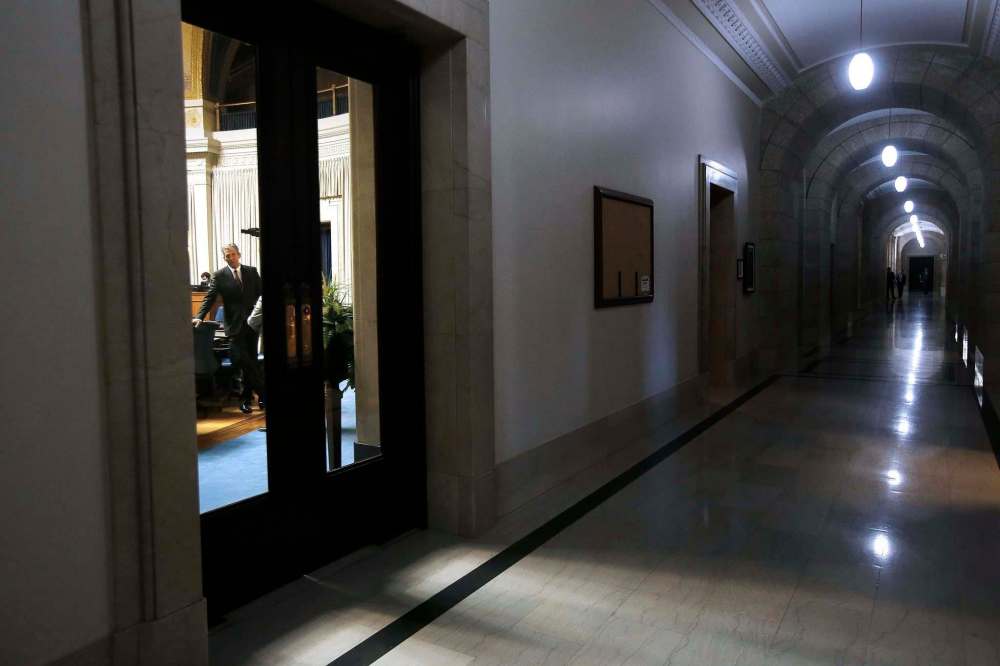
The update arrives at the end of the day — sometimes after 6 p.m. — and contains COVID-19 numbers announced hours earlier by the chief provincial public health officer and summaries of previously announced government programs.
With the legislature not in session, the Liberals have had to find other ways to hold the government to account.
“We’ve been putting out criticism and pointing out serious issues,” Lamont said.
Liberals have been vocal about the burdensome costs of Manitobans having to pay pharmacy dispensing fees for medication refills every 30 days; filling larger quantities has been suspended due to drug-supply concerns. They’re also raised concerns about a lack of personal protective equipment in hospitals and personal-care homes.
“From my point of view we need to get the message across that the situation, economically, is really serious,” Lamont said. “Now is not the time to go back to the reflex of cutting and everything else.”
• • •
While his government is preparing to reopen certain segments of society in the coming weeks, Pallister has not yet indicated when he may recall the legislature.
He brushed off the question Friday, saying it would be up to the house leaders to decide.
But the decision, ultimately, is his to make.
Earlier in the week, Goertzen said he wouldn’t rule out the possibility of periodic sitting days, but he added that would depend on obtaining agreement from the other parties and the status of public-health orders.
Without the daily question period, opposition voices have been largely muted during one of the most critical times in the province’s history, unlike Filmon facing a daily barrage of questions about the flood.
And in the wake of the 9/11 terrorist attacks in 2001, Gary Doer’s NDP government established an all-party committee that received briefings from provincial staff and had input in drafting legislation responding to that crisis.
While Pallister has exhorted Manitobans to follow his chief public health officer’s hand-washing and physical-distancing directives, his main preoccupation appears to be to try to contain a ballooning deficit, which could reach $5 billion this year.
Manitoba was one of the last provinces to offer any direct support for small business.
This week, Pallister falsely claimed that Manitoba was the most indebted province in Canada while defending criticism of ordered budget cuts to universities, certain government departments and Crown corporations.
This contrasts with other jurisdictions, where there has been greater emphasis on maintaining public-sector jobs and redeploying staff.
In bad times as well as good, Pallister appears unafraid to chart a course at variance with other provinces, always willing to take on public-sector unions, and always ready to marginalize his political opponents.
larry.kusch@freepress.mb.ca
carol.sanders@freepress.mb.ca


Our newsroom depends on a growing audience of readers to power our journalism. If you are not a paid reader, please consider becoming a subscriber.
Our newsroom depends on its audience of readers to power our journalism. Thank you for your support.
History
Updated on Friday, April 24, 2020 11:17 PM CDT: Full write through, final version


